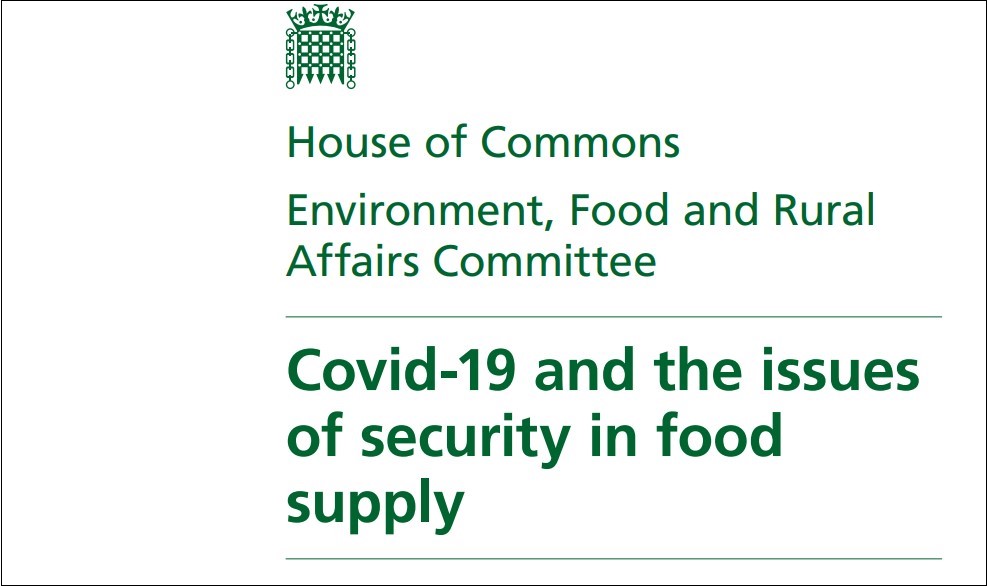Food systems impacts of COVID 19
Food systems impacts of COVID 19
Posted by Steve Guilbert
26 April 2021

By Prof. Michael Winter
On the 7th April 2021, the House of Commons Environment, Food and Rural Affairs Committee published a follow-up inquiry[1] to its initial inquiry in 2020[2] on the impacts of the pandemic on food. The focus of the new report is on food insecurity for individuals and the food supply chain. The report highlights how, in contrast to the first national lockdown when those shielding for health reasons received national food parcels, in the 2021 lockdown they were asked to rely on online delivery services or friends or family. The Committee highlighted concerns that this change of policy excluded people unable to afford retailers’ minimum spends and/or delivery charges. The Committee recommended that the Government should ask retailers to lower their minimum spend requirements and not to make delivery charges for shielding customers. Concerns were also highlighted around the issue of in-store COVID-19 measures causing difficulties for disabled customers and the need for retailers to make adjustments.
Not surprisingly, much of the report’s attention is directed to the shift in January from food parcels to vouchers for those families eligible for free school meals (the 1.7 million children in the UK living in households that are food insecure). As reported in the January version of this Bulletin, serious concerns, highlighted by Marcus Rashford amongst others, over the suitability of some of the parcels led to the reintroduction of a national voucher scheme. The Committee felt that schools should have multiple options for the provision of free school meals and be allowed to choose the best one for their own pupils’ needs. They concluded as follows:
It is therefore unfortunate that the failings of some suppliers, in terms of quality and value for money, led to a fall in public confidence in England given that parcels are the best option in some circumstances. It is important that the sector and Government learns from these failings and ensures that any future offering is consistently up to standard and delivers value for money.
The Committee took the opportunity to look beyond the immediate issue of dealing with food poverty in the context of COVID-19 lockdown restrictions and highlighted the need to understand better the causes and consequences of food insecurity:
… the Government should … produce annual reports on food security under the Agriculture Act, at least in the short to medium term. Ministers have mobilised their departments to support vulnerable people to access food during the pandemic, but this impetus needs to be sustained. A Minister for Food Security should be appointed and supported by robust cross-Government structures to ensure that all interested departments prioritise the issue of food insecurity, and the Government should consult on how a ‘Right to Food’ could be introduced in England.
The final report on the National Food Strategy will make for interesting reading in this context as will the Government’s response both to this Select Committee report and to the National Food Strategy report.
The Select Committee report also confronts the problems – discussed in earlier bulletins – faced by wholesalers impacted both by the sudden switch from food parcels to vouchers in January 2021[3] and by the decline of the hospitality sector. It urges Government to urgently assess the impact of the closures to the hospitality sector on its suppliers and provide additional financial support to them during the period of reopening.
As ever, with Select Committee reports, the report contains invaluable links to the submitted evidence, 42 different submissions in this instance.
[1] Environment, Food and Rural Affairs Committee, Seventh Report of Session 2019–21, ‘Covid-19 and the Issues of Security in Food Supply’, HC 1156.
[2] Environment, Food and Rural Affairs Committee, First Report of Session 2019–21, ‘COVID-19 and food supply’, HC 263.
[3] This was rightly seen by many as benefitting retailers at the expense of wholesalers. The retailers which participated in the voucher scheme were Aldi, Iceland, McColl’s, Morrisons, Tesco, Sainsbury’s, Asda, Waitrose, M&S, Farm Foods and the Company Shop Group (a retail outlet for the redistribution of surplus food and household products).